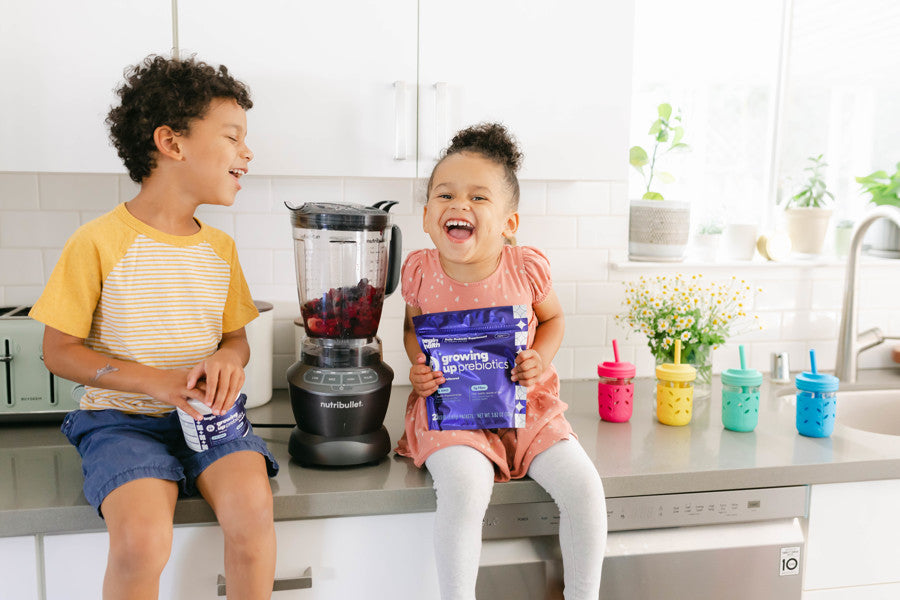Your Cart is Empty
Continue shoppingMagnesium vs. Laxatives for Kids’ Constipation
Medically Reviewed by May Zhu, RDN | Published September 03, 2024
share this article

Constipation in children is a common issue that can cause discomfort and distress for both the child and the parents. While laxatives are often used as a quick fix, many families are reporting behaviorial side effects from long-term use. Magnesium, a naturally occurring mineral, can help with laxation effects, which is becoming more popular for parents as a part of their kid's constipation relief strategy. This blog will explore the differences between magnesium and laxatives for support kids’ constipation symptoms, helping you make an informed decision for your kiddo's health.
The Prevalence of Childhood Constipation
Constipation affects up to 30% of children worldwide, making it one of the most common gastrointestinal complaints in pediatric care. The condition can lead to abdominal pain, discomfort, and even long-term issues like fecal impaction if not addressed properly. Parents often turn to over-the-counter laxatives for relief, but these come with potential risks and side effects.
Laxatives: Quick Relief but Not Without Risks
Laxatives are commonly used to treat constipation in children. They work by stimulating bowel movements through various mechanisms, such as increasing the water content in the intestines or irritating the bowel lining to prompt a bowel movement. While laxatives can provide quick relief, they are not always the best solution for long-term use.
Long-term use of laxatives can lead to dependence, meaning the bowel may become reliant on these drugs to function properly.
Additionally, some laxatives can cause side effects like cramping, diarrhea, and electrolyte imbalances. The potential for misuse or overuse is also a concern, especially in young children whose digestive systems are still developing.
Begin Health Expert Tip
Can prebiotics help kids with constipation? Find out what our health expert tells us about the differences between Prebiotics vs Laxatives.
Magnesium: A Vital Mineral for Kid's Health
Magnesium is a vital mineral that plays a crucial role in many bodily functions, including muscle and nerve function, energy production, and bone health. It also has a natural laxative effect, making it an effective remedy for constipation. Magnesium works by drawing water into the intestines, which helps soften the stool and promotes regular bowel movements.
Magnesium is less likely to cause dependence, making it a better option for long-term management of constipation.
How to Use Magnesium for Kids’ Constipation
When considering magnesium for your child’s constipation, it’s important to choose the right form and dosage. Magnesium citrate is one of the most commonly recommended forms due to its ability to draw water into the intestines to lubricate the stool. The recommended dosage varies depending on the child’s age and weight, so it’s best to consult a pediatrician before starting any new supplement.
Incorporating magnesium-rich foods into your kiddo's diet can also help. Foods like spinach, nuts, and seeds are excellent sources of magnesium and can promote regular bowel movements naturally.
Begin Health Expert Tip
There are several types of magnesium and some work better than others for constipation support. Check out our blog The Best Types of Magnesium for a Health Digestion to learn more about what kind of magnesium is best for your little one.
The Verdict: Magnesium vs. Laxatives
While laxatives can provide quick relief for constipation, they are not ideal for long-term use due to the potential for dependence and side effects.
Magnesium, on the other hand, might potentially be another tool for parents that offers a more natural and gentler approach to help with constipation symptoms such as hard stools in kids.
Constipation in kids may require a multi-factorial approach to a resolution, and parent should consider addressing the root causes so that solutions can offer more of a long-term resolution to support gut health for life.
Summary
Magnesium can potentially help with kid's constipation symptoms by drawing more water into the intestines to promote softer stools without the risk for dependence and potential side effects that are associated with laxatives.

Author
May Zhu, RDN
Trending

How to Transition Kids Off Stool Softeners Safely
read now
How to Know If Your Kid Needs a Stool Softener (or Something Else)
read now
Why Parents Are Choosing Prebiotics Over Stool Softeners for Kids
read now






